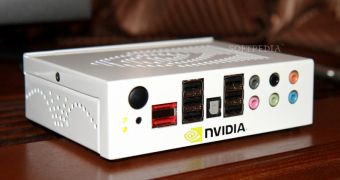NVIDIA's Ion platform, designed to combine an Atom processor with the graphics capabilities of a GeForce 9400M graphics chip solution, has certainly drawn the attention of many, when it was first released back in December 2008. It also made some heads turn, when it was showcased at this year's Consumer Electronics Show in Las Vegas, Nevada, which is why people are getting really interested in the released dates of any potential Ion-based products. Although the chip maker said that a number of partners had taken an interest in designing a product that would boast the performance capabilities of the Ion platform, no specific vendor names have been provided to this date. However, it looks as if Acer might just be one of them.
“We always work with all partners and look at their solutions. […] The benefits of Nvidia Ion are great including the ability to playback high-def content. You will see us looking at this technology much closer in our second half [of the year] products,” said Sumit Agnihotry, Acer’s vice president of product marketing, in an interview with Laptomag.
We still have no official release date for any Acer-branded product that will be designed using NVIDIA's Ion platform, but it's nice to see that at least one major PC vendor has publicly shown its interest in what appears to be one of the company's best products to date. Also, according to Drew Henry, general manager of MCP business at NVIDIA, the chip maker expects the first Ion-based PC product to come out as a nettop system, priced at US$299 and launched before June this year.
NVIDIA's Ion is capable of delivering DirectX 10, hardware-accelerated high-definition video playback in a small form factor PC system that is powered by Intel's Atom processor. The platform has already been certified for Microsoft's Windows Vista and is expected to provide netbook and nettop users with a considerable boost in performance, when it comes out later this year. Also, Ion-based systems are expected to provide a number of noteworthy features, for a price tag that can rival that of most systems powered by a full Intel solution.

 14 DAY TRIAL //
14 DAY TRIAL //